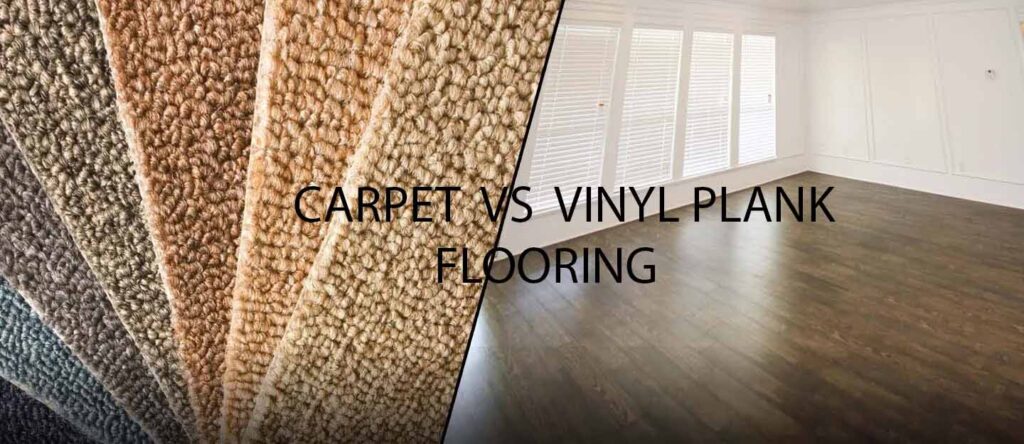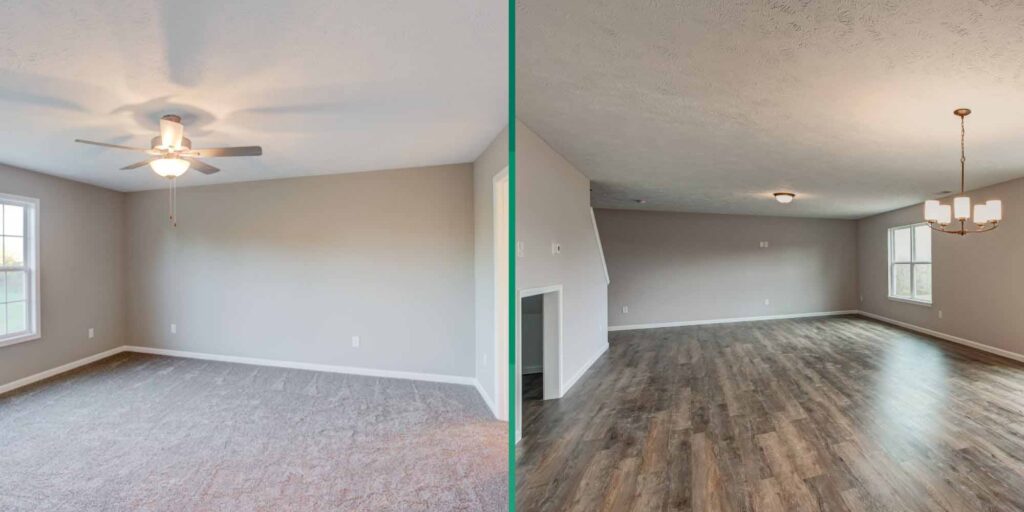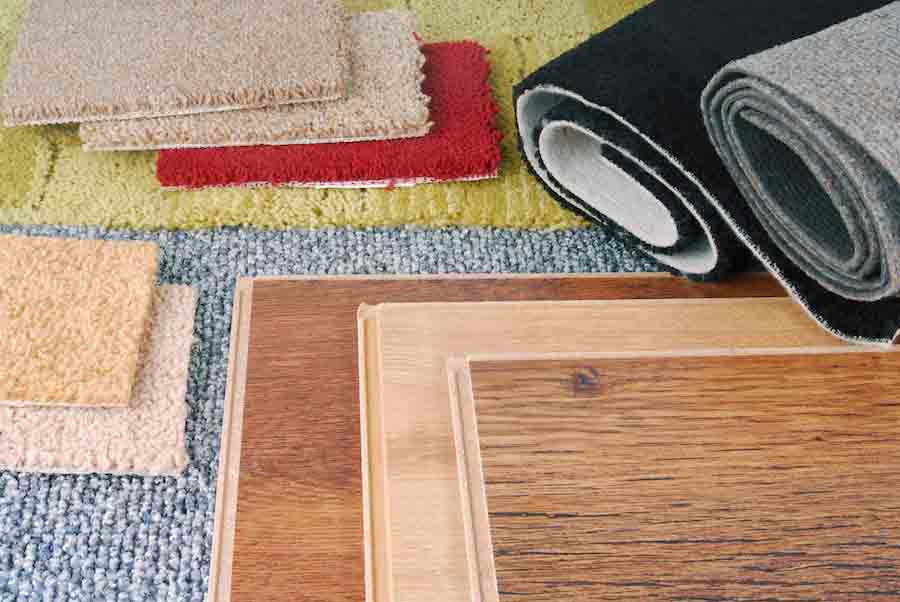Choosing the right flooring option for your home or office can be a challenging decision. With so many choices available, vinyl flooring and carpet stand out as two of the most popular options. Both offer unique benefits, but how do you decide which one is best for your needs? In this ultimate guide, we’ll explore the key differences between vinyl flooring and carpet, comparing their durability, maintenance needs, cost, and environmental impact to help you make an informed choice.
Vinyl flooring is known for its durability, easy maintenance, and water resistance, while carpet offers warmth, comfort, and noise insulation. The choice between the two depends on factors such as traffic, maintenance preferences, and environmental considerations.
Whether you’re renovating a single room or outfitting an entire commercial space, understanding the pros and cons of each type of flooring will ensure you make the best decision for both your budget and long-term needs. Let’s dive into the details and help you find the ideal flooring solution for your space.
1. What Are the Key Differences Between Vinyl Flooring and Carpet?

Vinyl flooring and carpet differ significantly in terms of material, construction, and design options. Vinyl is made from synthetic materials such as PVC, while carpet is typically made from fibers like nylon, polyester, or wool. Both offer a range of styles, but their aesthetic appeal and physical properties vary greatly.
Vinyl flooring is made of synthetic materials like PVC and is more durable, whereas carpet is made of fibers such as nylon and wool, offering comfort and warmth. The main difference lies in texture, installation, and long-term maintenance.
- Materials: Vinyl flooring consists of several layers, including a wear layer, a vinyl core, and a backing layer, which makes it durable and resistant to moisture. Carpet, on the other hand, is constructed from woven or tufted fibers backed by a latex or foam layer. The choice of fiber in carpet impacts its feel, durability, and maintenance needs.
- Texture and Comfort: Carpet provides softness underfoot, making it a comfortable choice for living rooms and bedrooms. It also offers better noise insulation compared to vinyl flooring, making it ideal for reducing sound in apartments or offices. Vinyl flooring, though less soft, offers a smooth, durable surface and is easy to clean.
- Design Options: Both flooring types offer a wide variety of designs. Vinyl comes in tiles, planks, and sheets, mimicking wood, stone, or tile, whereas carpet offers a wider range of textures, patterns, and colors that can fit any room’s decor.
| Feature | Vinyl Flooring | Carpet |
|---|---|---|
| Material | PVC, synthetic layers | Nylon, polyester, wool fibers |
| Texture | Smooth, rigid | Soft, plush |
| Installation | Easy (click-lock, glue-down) | Requires professional installation |
| Design Flexibility | Wood, stone, or tile finishes | Various colors, textures, patterns |
2. Which Option Offers Better Durability: Vinyl Flooring or Carpet?

When it comes to durability, vinyl flooring generally outperforms carpet, especially in high-traffic areas. Vinyl flooring is resistant to moisture, stains, and damage from heavy furniture. In contrast, carpet, though durable in its own right, can be prone to stains, wear, and fading, particularly in high-traffic spaces.
Vinyl flooring is more durable than carpet, offering better resistance to moisture, stains, and wear. Carpet, while soft and comfortable, is less resilient and may require more maintenance over time.
- Water Resistance: Vinyl flooring excels in areas that are exposed to moisture, such as kitchens, bathrooms, and basements. It is completely waterproof, preventing water from seeping into the subfloor and causing damage. Carpet, however, can absorb moisture, leading to mildew, mold, and odor issues, particularly in humid environments.
- Wear and Tear: Vinyl flooring has a wear-resistant surface, making it ideal for high-traffic areas like hallways, living rooms, and commercial spaces. Carpet fibers, on the other hand, wear down over time, especially in areas with heavy foot traffic, leading to matting and fading. Regular cleaning and professional treatments can extend the lifespan of carpets but cannot eliminate natural wear.
- Stain Resistance: Vinyl is highly resistant to stains, making it an excellent choice for homes with children or pets. Carpet, although available in stain-resistant varieties, can still absorb liquids and dirt, making it harder to maintain in the long term.
| Flooring Type | Stain Resistance | Water Resistance | Durability |
|---|---|---|---|
| Vinyl Flooring | High | Excellent | Excellent |
| Carpet | Moderate | Low | Moderate |
3. How Does Vinyl Flooring Compare to Carpet in Terms of Maintenance?

Both vinyl flooring and carpet require regular maintenance, but the level of effort and frequency of cleaning varies. Vinyl flooring is generally easier to maintain, requiring only occasional sweeping and mopping. Carpet, on the other hand, needs more frequent cleaning and specialized treatments to maintain its appearance.
Vinyl flooring is much easier to maintain than carpet, requiring less frequent cleaning and no special treatments. Carpet needs regular vacuuming and occasional professional cleaning to avoid dirt buildup.
- Routine Cleaning: Vinyl flooring only needs regular sweeping and occasional mopping to keep it looking clean. Since it’s resistant to dirt, dust, and stains, it requires minimal upkeep. Carpet requires frequent vacuuming to remove dirt and dust, as well as periodic deep cleaning to prevent the buildup of allergens and bacteria.
- Long-Term Care: Vinyl flooring is incredibly low-maintenance. Its smooth surface means dirt, pet hair, and spills don’t seep into the material, making it easy to wipe away messes. Carpet, while soft and cozy, is much more prone to trapping dirt and stains, and it requires regular professional cleaning to maintain its appearance.
- Professional Treatments: Carpets benefit from regular deep cleaning by professionals to remove embedded dirt and stains. Additionally, carpets may require treatments like stain protectors to improve longevity and reduce maintenance efforts.
| Maintenance Aspect | Vinyl Flooring | Carpet |
|---|---|---|
| Routine Cleaning | Sweep, mop, wipe | Vacuum regularly, occasional deep cleaning |
| Long-Term Care | Minimal maintenance | Requires professional cleaning |
| Special Treatments | None needed | Stain protection, steam cleaning |
4. Are Vinyl Flooring and Carpet Suitable for All Areas of the Home or Office?

The suitability of vinyl flooring and carpet depends largely on the room’s function, foot traffic, and exposure to moisture. Vinyl flooring is ideal for spaces that need durability and water resistance, while carpet is better suited for areas that require comfort and sound absorption.
Vinyl flooring is better suited for areas with high moisture or foot traffic, such as kitchens and bathrooms. Carpet is ideal for bedrooms, living rooms, and offices where comfort and noise reduction are priorities.
- High-Traffic Areas: Vinyl flooring excels in areas with high foot traffic like kitchens, hallways, and commercial spaces. Its resistance to wear and tear, along with ease of maintenance, makes it an ideal choice for these environments. Carpet, while comfortable, is prone to matting and staining in high-traffic zones, making it less suitable for such areas.
- Moisture-Prone Areas: Vinyl flooring is waterproof and works well in spaces like bathrooms, basements, and kitchens, where moisture is a concern. Carpet, however, can absorb moisture, leading to mold and mildew growth, which makes it unsuitable for these environments.
- Comfort and Aesthetic: Carpet is the go-to option for bedrooms and living rooms where comfort, warmth, and sound insulation are needed. Its plush surface provides a cozy, inviting feel, whereas vinyl is better suited for practical, functional spaces.
| Room Type | Vinyl Flooring | Carpet |
|---|---|---|
| High-Traffic Areas | Ideal for kitchens, hallways, offices | Prone to wear and tear |
| Moisture-Prone Areas | Great for bathrooms, basements | Not suitable for wet environments |
| Comfort & Aesthetic | Less comfortable, practical design | Ideal for comfort, warmth, noise insulation |
5. What Are the Costs Associated with Vinyl Flooring vs Carpet?
Cost is an important consideration when choosing between vinyl flooring and carpet. While both are affordable options, the initial and long-term costs can vary depending on the type of vinyl or carpet chosen.
Vinyl flooring generally has a higher upfront cost compared to carpet, but it’s more cost-effective in the long run due to lower maintenance and greater durability.
- Initial Cost: Vinyl flooring costs between $2 and $7 per square foot, depending on the quality and type. High-end luxury vinyl tiles (LVT) and planks (LVP) are more expensive but offer excellent durability. Carpet can cost between $1 and $5 per square foot, but high-quality carpet materials may exceed this range.
- Installation Costs: Installation for both vinyl and carpet can vary. Vinyl flooring, especially with click-lock systems, is often DIY-friendly and requires minimal labor costs. Carpet, on the other hand, typically requires professional installation, adding to the cost.
- Long-Term Value: Vinyl flooring offers long-term savings because it requires minimal maintenance and has a longer lifespan. Carpet, while affordable initially, may need to be replaced or cleaned more frequently, which can add up over time.
| Cost Aspect | Vinyl Flooring | Carpet |
|---|---|---|
| Initial Cost | $2-$7 per sq ft | $1-$5 per sq ft |
| Installation Cost | Low (DIY options available) | High (Professional installation) |
| Long-Term Value | Low maintenance, long lifespan | High maintenance, may need replacement |
6. Which Option Is More Eco-Friendly: Vinyl Flooring or Carpet?

Environmental impact is a growing concern for many homeowners and businesses. While vinyl flooring is made from synthetic materials, many manufacturers are adopting eco-friendly practices. Carpet, on the other hand, has a higher environmental impact due to the use of chemicals and non-recyclable materials.
Vinyl flooring, especially with certifications like FloorScore, can be more eco-friendly than carpet, depending on the production methods. Carpet’s environmental footprint can be higher due to its reliance on non-renewable resources.
- Sustainability of Vinyl: Modern vinyl flooring products can be made from recycled materials and can be fully recyclable at the end of their life cycle. Look for products with certifications like FloorScore or GREENGUARD for low VOC emissions and sustainability.
- Carpet’s Environmental Impact: Carpet manufacturing often involves chemicals and adhesives that can emit VOCs. Additionally, carpet fibers are not always recyclable, which means it can end up in landfills. However, there are more eco-friendly carpet options available that use natural fibers and low-impact dyes.
| Environmental Impact | Vinyl Flooring | Carpet |
|---|---|---|
| Sustainability | Made from recyclable materials | Often made with non-renewable resources |
| Recyclability | Can be recycled at the end of life | Difficult to recycle, contributes to landfill |
| VOC Emissions | Low emissions with certifications | Higher emissions in some products |
Conclusion
Both vinyl flooring and carpet offer unique benefits depending on your needs, whether it’s durability, comfort, or cost. Vinyl flooring excels in areas with high traffic, moisture, and the need for low maintenance, while carpet provides warmth, comfort, and sound insulation.
At Kinwin, we offer high-quality SPC vinyl flooring that meets the highest standards of performance and environmental sustainability. If you’re interested in learning more about our products or would like to request a custom quote, don’t hesitate to reach out to us today!


